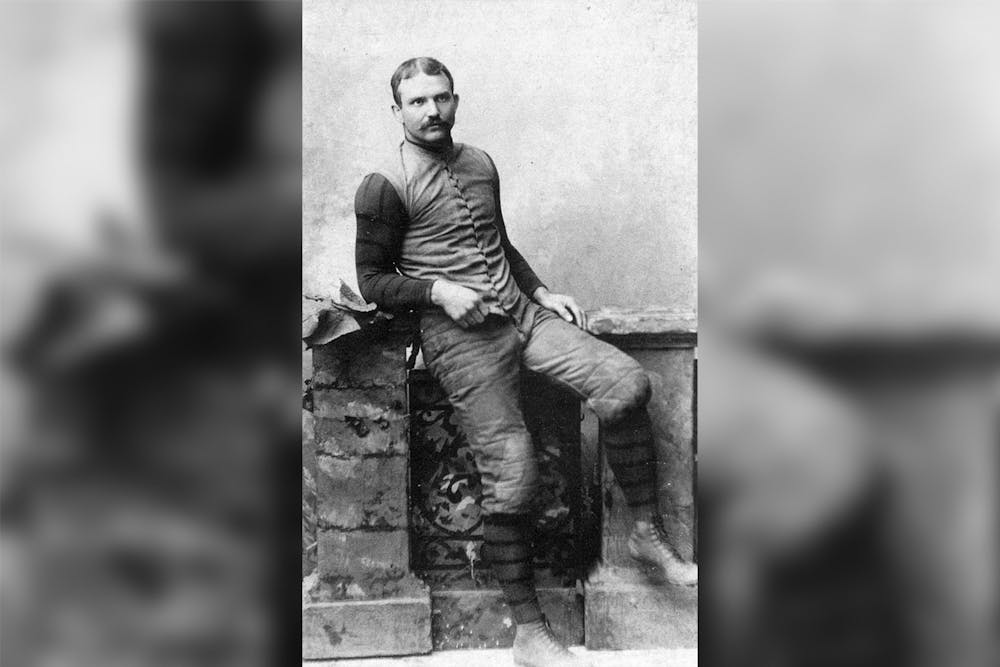One of the most successful coaches in Penn football history coached only one season in the 20th century, yet is responsible for over 15% of the total wins in Penn football history. George Washington Woodruff was an early football innovator who led Penn to three national championships on his way to a 124-15-2 record and an induction into the College Football Hall of Fame.
Woodruff was born in rural Pennsylvania and at the age of 18 went north to attend Yale. While there, he was a three-sport athlete, most notably a member of the football team, which went 38-1-1 in his four years as a starter. He was also an impressive student, winning the Winthrop Award for excellence in Greek and Latin studies.
Four years after graduating from Yale, Woodruff decided to return to school, enrolling in law school at Penn beginning in 1892. Immediately upon his arrival, Woodruff became involved in Penn Athletics, taking over the position as the school’s football coach from Elwood Otto Wagenhurst, who coached the team to an 11-2 record in 1891.
Under the guidance of Woodruff, Penn football continued its success, improving to 15-1 in 1892. The most notable moment of Woodruff’s first season coaching occurred on Nov. 5, 1892, when Penn took on Princeton. Coming into the matchup, the Quakers had never won a matchup against the Tigers, having lost 28 consecutive games against them dating back to 1876. Penn came into the game with a pristine 12-0 record, fielding the most successful team in program history to date. Princeton also came in sporting an undefeated 11-0 record. In the most important game in program history, Woodruff led the team to a key 6-4 victory over their arch rivals, shocking the college football world and firmly establishing Penn as a top-tier program.
In 1893, Woodruff again coached the team to a successful year, going 12-3, with wins over Navy and Cornell. Despite a strong 11-0 start, the team had a shaky finish to the season, as the Quakers dropped three of their last four with losses against Ancient Eight rivals Princeton, Yale, and Harvard.
Despite the rocky end to the 1893 season, the Quakers started the 1894 season successfully, winning their first nine games to set themselves up with matchups against Princeton, Cornell, and Harvard to end the season. Penn rolled through each of its rivals, winning two of the games via shutout on its way to the program’s first-ever undefeated season, finishing the year 12-0. Penn was crowned national champion at the end of the year, its first-ever national championship.
On the back of the 1894 season, led by Woodruff’s coaching and stellar play from college football Hall of Famers T. Truxtun Hare and Charles Saladin Gelbert, Penn went on a four-year run from 1894 to 1897, one of the most successful in college football history. Penn won three national championships in this period (1894, 1895, and 1897), going 55-1 over that span. Penn’s 15-0 season in 1897 was the last time that a college football team went 15-0 in a single season for over 100 years, with the feat not being repeated until Clemson went 15-0 in 2018.
Woodruff coached the Red and Blue for another four seasons. Although he never won another national championship, he still led Penn to a 42-10-2 record between 1898 and 1901. Upon his departure in 1901, Woodruff had compiled a 124-15-2 record over 10 seasons, winning three national championships and coaching some of the greatest Penn football teams of all time. Woodruff still holds the Penn record for highest coach winning percentage and is fourth all time in college football history, behind legendary coaches Knute Rockne, Frank Leahy, and Urban Meyer. He also is second all time in wins by a Penn coach, 24 wins behind Al Bagnoli — despite Bagnoli coaching for 23 seasons to Woodruff’s 10.
In addition to his contributions as a coach, Woodruff was also a football pioneer, originating new offensive plays and schemes in the early days of the sport when strategy was still being developed. Woodruff came up with the guards’ back formation and plays such as the delayed pass and flying interference. These new strategies were critical in his success and were used for decades after.
Following his departure from Penn, Woodruff moved into politics, working at both a state and local level, most notably rising to the position of Acting Secretary of the Interior under President Theodore Roosevelt during Roosevelt’s second term. Woodruff was inducted into the College Football Hall of Fame in 1963, cementing his place as one of the most legendary football coaches in Penn history.
Woodruff helped pull Penn into national prominence in his 10 years as a coach, helping set the stage for a successful 15-year run in which the Red and Blue captured six of their seven national championships. Despite his coaching tenure ending over a century ago, his influence extends to today, as his winning ways set up Penn football culture for success long after his retirement.









